Glimmer Train Stories – Winter 2014
In my admittedly brief career as a reviewer, I’ve not encountered any literary journals that concentrate almost exclusively on the short story. I really like the idea, and obviously so do many other readers. Two differences I noticed about Glimmer Train Stories: this is the only lit mag I’ve read so far that isn’t connected to a college or university; and it’s the only one that includes a bookmarker as a bonus. In my admittedly brief career as a reviewer, I’ve not encountered any literary journals that concentrate almost exclusively on the short story. I really like the idea, and obviously so do many other readers. Two differences I noticed about Glimmer Train Stories: this is the only lit mag I’ve read so far that isn’t connected to a college or university; and it’s the only one that includes a bookmarker as a bonus.
The brainchild of two sisters, Glimmer Train Stories was conceived in 1990. Their goals in part were to publish stories that are “emotionally significant,” that favor works by new authors, and that “pay writers well.” In fact, the sisters state they pay out “over $50,000 to fiction writers.”
The Winter 2015 issue includes fourteen stories, two interviews, and a section, “The Last Pages,” that contains snippets from each author. Another interesting feature is that each article has a black-and-white picture of its author.
Let’s talk about one of the interviews first. David Naimon asked award-winning author George Saunders some questions that seemed to me, a graduate student in writing, just for my personal consumption. Saunders reveals how his style developed over time. He started off with a more formal style, and thanks to “[. . .] some crisis moment I reverted to a set of skills that I had as a kid—to just be funny, a little pop-culturish, to be sci-fi.” Saunders had other pithy, illuminating remarks that ensured I received a lesson in craft I will stash away in my own literary sea bag.
The stories naturally are the reason for the magazine. With so many from which to choose, I selected two on which to focus this review: Natasha Tamate Weiss’s “What It Means to Rush” and “Third World Kroger” by Greg Schreur. I selected the first because of my years living in Japan and the second because I can relate to one of the situations Schreur describes.
Weiss spins a yarn about a family whose roots are in Japan. They travel from their home in Seattle to see the family’s matriarch one final time before she passes. The family’s plan is to go straight from Seattle to the grandmother’s home in Minnesota. The family—now composed of the unnamed narrator, her mother, her mother’s fiancé, and her younger brother—set out. Only a day or two into the journey, the family makes a detour to a Native American reservation. The story, told in a style reminiscent of a memoir, is a compelling read. I found empathy with both the narrator and with one of the characters she encounters on the reservation. Weiss’s use of language is evocative. I enjoyed her dialogue play. For example, this snatch of conversation on the reservation:
I interrupted, “Before, what did you mean by something ugly?”
“Huh?” said Joe.
“You know, you said you’d like to grab people by the earlobe and show them—”
“Right, right.” He paused to think. “There’s a cemetery out back, behind this here deli and down the road a bit.”
The scene brought to my mind the old saw “East meets West,” but with a twist.
The title “Third World Kroger” caught my eye because my wife and I shop at one of the chain’s local stores. It’s a poignant yet humorous story about a husband and father’s emotional handling of the kidnapping and murder of his young son. Schreur’s narrator and his wife attempt to assuage their grief, and perhaps their guilt, through the baking and eating of cakes. My personal favorite scene takes place at the Third World Kroger, so-called because of its seedy locale and dubious clientele. The narrator goes to pick up flour for more cakes, resulting in his using the public restroom. What happens there is in turn funny, perhaps gross, but ultimately heartening. Here’s a sample:
I grab his arm without gentleness or violence. He accepts my grasp like he’s been waiting for it [. . .] I lead him out of the bathroom and sit him on a bench next to the customer service desk. “This guy needs some help,” I tell the woman behind the desk [. . .]
“He’s one of those idiots from Birch Field,” she says.
I found the story poignant but not syrupy.
Glimmer Train Stories is a marvelous addition to the library of aficionados of short stories. Its beautifully executed cover artwork blankets many hours of comforting, thought-provoking, and simply entertaining works. I’m happy for the chance to review it.
[www.glimmertrain.org]





